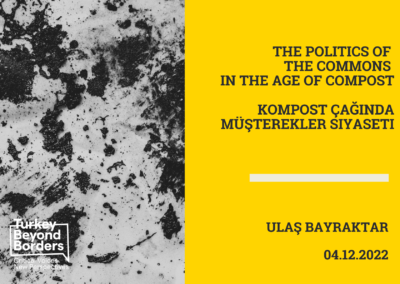Dr. Bilge Yabancı
- Title: Transformation of Civil Society Under Autocratic Pressure (Part 2)
- Başlık: Otoriter Baskı Altında Sivil Toplumun Dönüşümü (Bölüm 2)
- Date/Tarih: 2 Mar/Mart 2022
Recommended Readings / Önerilen Okumalar
- Armony, Ariel C. 2004. The Dubious Link: Civic Engagement and Democratization. Stanford, Calif: Stanford University Press.
- Benthall, Jonathan (2000) “Civil society’s need for de-deconstruction,” Anthropology
- Today, 16(2): 1–3.
- Buttigieg, Joseph A. 2005. “The Contemporary Discourse on Civil Society: A Gramscian Critique.” Boundary 2 32 (1): 33–52.
- Buyse, Antoine. 2018. “Squeezing Civic Space: Restrictions on Civil Society Organizations and the Linkages with Human Rights.” The International Journal of Human Rights 22 (8): 966–88.
- Carothers, Thomas, and Saskia Brechenmacher. 2014. Closing Space: Democracy and Human Rights Support Under Fire. Washington D.C.: Carnegie Endowment.
- Chandhoke, N. 2007. “Civil Society.” Development in Practice 17 (4–5): 607–14.
- Chandhoke, N. 2001. “The ‘Civil’ and the ‘Political’ in Civil Society.” Democratization 8 (2): 1–24.
- Cohen, Jean L. and Andrew Arato (1992) Civil Society and Political Theory. Cambridge, MA: The MIT Press.Doyle, Jessica Leigh. 2017. “Government Co-Option of Civil Society: Exploring the AKP’s Role within Turkish Women’s CSOs.” Democratization 25 (3): 445–63.
- Encarnación, Omar G. 2006. “Civil Society Reconsidered.” Comparative Politics 38 (3): 357–76.
- Foley, Michael W., and Bob Edwards. 1996. “The Paradox of Civil Society.” Journal of Democracy 7 (3): 38–52.
- Giersdorf, Stephan, and Aurel Croissant. 2011. “Civil Society and Competitive Authoritarianism in Malaysia.” Journal of Civil Society 7 (1): 1–21.
- Glasius, Marlies. 2016. “Civil and Uncivil Society.” In The Blackwell Encyclopedia of Sociology, 1–7. American Cancer Society.
- Kamat, Sangeeta. 2004. “The Privatization of Public Interest: Theorizing NGO Discourse in a Neoliberal Era.” Review of International Political Economy 11 (1): 155–76.
- Kumar, Krishhan (1993) “Civil Society: An Inquiry into the Usefulness of a Historical Term,” The British Journal of Sociology, 44(3): 375–395.
- Lewis, David. 2013. “Civil Society and the Authoritarian State: Cooperation, Contestation and Discourse.” Journal of Civil Society 9 (3): 325–40.
- Navaro-Yashin, Yael (1998) “Uses and abuses of ‘state and civil society’ in contemporary
- Turkey,” New Perspectives on Turkey, (18): 1–22.
- Ortmann, Stephan. 2012. “Policy Advocacy in a Competitive Authoritarian Regime: The Growth of Civil Society and Agenda Setting in Singapore.” Administration & Society 44 (6): 13–25.
- Shefner, Jon, and Harry F. Dahms. 2012. “Civil Society and the State in the Neoliberal Era: Dynamics of Friends and Enemies.” In Theorizing Modern Society as a Dynamic Process, edited by Harry F. Dahms and Lawrence Hazelrigg, 30:235–61. Current Perspectives in Social Theory. Emerald Group Publishing Limited.
- Walzer, Michael. 1999. “Rescuing Civil Society.” Dissent 46 (1): 62–67.
- Yabanci, Bilge. 2019. “Turkey’s Tamed Civil Society: Containment and Appropriation under a Competitive Authoritarian Regime.” Journal of Civil Society 15 (4): 285–306.
- Yabanci, Bilge. 2021a. “Civil Society and Latent Mobilisation Under Authoritarian Neoliberal Governance.” In Authoritarian Neoliberalism and Resistance in Turkey: Construction, Consolidation, and Contestation, edited by İmren Borsuk, Pınar Dinç, Sinem Kavak, and Pınar Sayan, 211–34. Singapore: Springer. https://doi.org/10.1007/978-981-16-4213-5_10.
- Yabanci, Bilge. 2021b. “Home State Oriented Diaspora Organizations and the Making of Partisan Citizens Abroad: Motivations, Discursive Frames, and Actions Towards Co-Opting the Turkish Diaspora in Europe.” Diaspora: A Journal of Transnational Studies 21 (2): 139–65.
- Yabanci, Bilge. 2021c. “Compliance and Push-Back: Politicization of Turkey’s Civil Society and Interest Groups under Autocratization.” APSA Newsletter 19 (3): 16–22.
- Yabanci, Bilge. 2021d. “Work for the Nation, Obey the State, Praise the Ummah: Turkey’s Government-Oriented Youth Organizations in Cultivating a New Nation.” Ethnopolitics 20 (4): 467–99.




